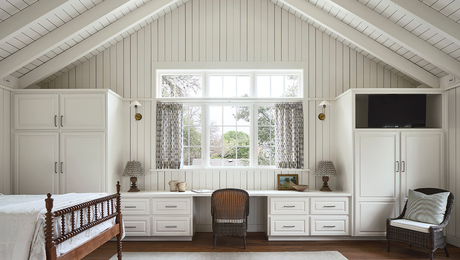*
My Weil McLain boiler has been “crackling” all season. The unit had been drawing air into the system requiring frequent (monthly) bleeding. I had a technician come out, who replaced some suspect piping and valves, and re-bled the system.
After all that, the tech said that “scale” could be causing the crackling noise I am hearing. Is scale a byproduct of hard water?
Can “scale” be removed or mitigated in some way? Do I need to have the boiler disassembled a nd mechanically cleaned in some way? What else could cause this sound?



















Replies
*
I think your man is right about what is causing the noise. Boilers develop scale under conditions as you describe or when there is a leak and water containing air is constantly introduced to the system. If you have underground piping and your water feed to the boiler is left on, you may have a small leak and don't know it. As for the cure, you can add a substance to the boiler which will often take care of this problem . Sometimes the boiler is so scaled that it must be replaced. A lot of scale is not good for your heat transfer efficiency either. I would get the boiler repair man to try the chemicals first and by all means, make sure you don't have a water leak somewhere.
*Scott,Scale is a product of hard water in most cases. It is a generic term that refers to any precipitate (remember high school chemistry?) plating out on heat exchanger surfaces, i.e. boiler tubes. It is normally calcium carbonate, which is the prime "hardening" mineral in well water. It can be removed with acid cleaning. It can be mitigated or prevent with treatment of the feedwater by softening or ion exchange. Another "scaling" compound in boiler water is iron oxide or rust. You mentioned air inleakage. Get that problem eliminated first. Once the system is up and running you should not have to bleed the system regularly. If you have a steam system there is more oppurtunity for air inleakage, depending on degign, presence of vacuum breakers, traps leaking etc. If you have a hot water system, once filled and vented, no air should be entering the system.
*I too used to have an old 300,000 BTU wiel maclain boiler. It originally was a coal-fired boiler, then converted to fuel oil, and then converted in the early 50's or 60's to natural gas. It was a SINGLE PIPE Steam system and when I replaced it, I kept the single pipe system because it was easier and pretty efficient. THe old boiler kept springing leaks in the water tubes in the heating area, and I kept patching and plugging it with PROPOXY 20 steel-reinforced Epoxy putty and sheet metal washers. It should have been condemned in 1986, but, I was a boiler roundsman at a local packing house and I was pretty good at keeping things running. When I finally did replace it (about 1996) the savings in using the new boiler would have paid for the new boiler if I had replaced it way back in 1986!! Live and Learn. Back to your problem. If you have a steam system, one of the biggest causes of pipes knocking and banging, is if the radiators are not "leveled" correctly. As floors sag and settle, it is common for radiators to lose their alignment. The steam should go in at one end of the radiator and the "deairareator" valve should be at the other end of the radiator. The condensate will drain right back out of the radiator the same way in comes in as steam, so the entry end should be a tad bit lower than the other end. Shim the far end of the radiator with wood lath or something to create about a 1/4 to 1/2 inch rise. If the condensate builds up and has to work against the steam that is coming in, it causes pipes to jump, buck, and bang and it's very annoying. ALso, if you get your radiators all "leveled" out this year, don't be surprised if they need readjusting in the next season or two, again. If your system is hotwater recirculator system, then, I would have to agree with G.LaLonde and the others concerning the scale. If your boiler is an old antique (like my old monster) and was modified to hot water system, perhaps a new boiler is in order and the wisest investment? Otherwise, your boiler man could recommend some treatment chemicals to "de-oxygenate" your boiler water. You could even learn to do the tests and routinely do boiler water tests on your boiler and add chemicals to treat it yourself. I would suggest that you hire a professional for the acid/caustic flush treatment, however, to be sure that it is done properly and then take precautions to treat the feedwater so that re-calcification does not reoccur. Scotty/sioux city.
*www.spirovent.comThis fixes cracking and banging due to air leaks."Bleeding" the system is alomost a joke compared to how well these units work. I say this from firsthand experience.-Rob
*There are too types of water in a boiler: bad and bad. That from an industrial boiler service person I know. Hard water causes scale, scale is an insulator. As the iron heats up it can't transfer the heat to the water. Snap crackle pop and fast boiler wear. Soft water is corrosive in that it allows metals to dissolve into it. It "eats" at the metal. This is why closed systems and open systems need different water treatment too. Different chemical reactions. The "bucket of lye" descaling will get that darned old scale-and every joint or soon too be leak will open right up. Proper water treatment is not voodoo, its just good chemistry that few folks take time to think about. Cause it costs money and a service call, that's why.
*Rob,Thanks for the lead - couldn't get much detail from the web-site, but I gather these are available for a home-sized boiler. I will get one!Thanks Scott
*ScottYou might try heatinghelp.com - a website devoted to steam and hydronic heating problems. You also might pick up a couple of Dan Holohan's books (it is his website), they are excellent.The website and responses have been among the best (quality of advice) I have found.Good luck.
*
My Weil McLain boiler has been "crackling" all season. The unit had been drawing air into the system requiring frequent (monthly) bleeding. I had a technician come out, who replaced some suspect piping and valves, and re-bled the system.
After all that, the tech said that "scale" could be causing the crackling noise I am hearing. Is scale a byproduct of hard water?
Can "scale" be removed or mitigated in some way? Do I need to have the boiler disassembled a nd mechanically cleaned in some way? What else could cause this sound?